Interview with Sylvia Schedelbauer: towards a cinema of personal narrative
11 Feb 2006
This interview took place on the Internet between the USA and Germany after I met Sylvia in San Francisco when she was visiting here. I had heard about her film from a friend, and since I am interested in autobiography and the lives of people living in cross-cultural families, I thought it would make interesting subject matter for Otherzine. The film draws largely from original photographic material and in this sense reframes the personal in terms of authenticity and contributes to the genre of personal narrative filmmaking which has so marked the San Francisco film scene, and has been a pivotal element in feminist film and the film industry as a whole.
— Molly Hankwitz, January 2006
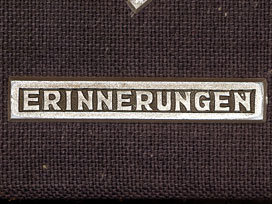 Sylvia Schedelbauer’s film begins with the word “Erinnerungen (Memories)” on what looks like an innocuous photo album. The next image reveals the German Nazi emblem above that word. Behind the cover of her grandfather’s album are stories of his life in the German military during National Socialism. The grandchild tries to recognize a relative she never even met in photos of the troops, a man who died at Stalingrad. After the war, Schedelbauer’s voiceover continues, her father had moved to Japan as a commercial agent, where he had married a local woman. Born in Japan, Schedelbauer herself grows up bicultural in a society that remains alien to her, and only discovers deeper reasons for her alienation as an adult: those who do not know their roots will have an uneasy place in the present, the ‘here and now.’ Both her father and mother remain silent about the past. Schedelbauer endeavours to find a narrative history to explain the photos; at the same time, she questions her search for identity.
Sylvia Schedelbauer’s film begins with the word “Erinnerungen (Memories)” on what looks like an innocuous photo album. The next image reveals the German Nazi emblem above that word. Behind the cover of her grandfather’s album are stories of his life in the German military during National Socialism. The grandchild tries to recognize a relative she never even met in photos of the troops, a man who died at Stalingrad. After the war, Schedelbauer’s voiceover continues, her father had moved to Japan as a commercial agent, where he had married a local woman. Born in Japan, Schedelbauer herself grows up bicultural in a society that remains alien to her, and only discovers deeper reasons for her alienation as an adult: those who do not know their roots will have an uneasy place in the present, the ‘here and now.’ Both her father and mother remain silent about the past. Schedelbauer endeavours to find a narrative history to explain the photos; at the same time, she questions her search for identity.
—Adapted from the festival magazine of the 51st International Short Film Festival, Oberhausen
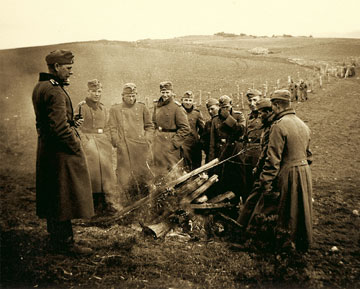
Molly: I wanted to look at “Memories” because it was mentioned that you had made a film entirely of still photos about your father, your grandfather and his service in World War II. I’m not a filmmaker; I’m a writer and some films are just so rich in detail of elaborate untold histories that I could not help but to want to see a film which dealt with the strange post-war period as an autobiography and family story. Can you talk a bit about finding this material and what relationships your family had to the photos and to each other?
Sylvia: I found the photo album belonging to my grandfather and many shoe boxes full of pictures hidden away in a closet. I never really found out what kind of relationship my father had had to his father, but I suppose since he was only five years old when the Second World War broke out, he probably never really got to know him. I imagine that my grandmother was the reason why most of the pictures came into existence in the first place: she was the one they were sent to, first by my grandfather who left her behind as a soldier, then later by my father, who was her only son and left home at seventeen to find work in West Germany and again later, in Japan.
But my point, of course, is not that I reproach [my parents] for having been a part of the war, but rather for denying access to a past or annulling a history that brought them together, mystifying whatever they had gone through to get to that middle class status that they had so much desired.
I think my father sent her letters home regularly, with photographs of himself, to show her how far he had come and how much he had achieved. Then, after she had passed away all the photographs returned to my father who hid them away in shoeboxes.
So there these photos were, and they all had their own narratives that I read into them. Like I say in the movie, my parents really never told me much, in fact, anything related to the time before my birth is phrased in cryptic fragments. There is a discrepancy between the images and the fragmentary bits of information they gave me; and there is the dialogue between my own fantasy and the narrative that I place the photographs in, in the film.
Molly: Can you remember when you disclosed your interest in the content to your family and what their responses were? What were some of their responses to your making the film? I wonder only because these moments are often rather strange encounters with precisely the ideas with which an artist is concerned...
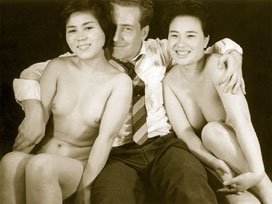 Sylvia: My parents never knew I had found the photos! I doubt my father remembered some of the photographs – I think he didn’t even know some existed, such as the one of him and two naked Japanese women. I secretly took the pictures with me. After the movie was made and was about to be shown publicly, I realized I had to let my parents in on it. I showed it to my mother first. She didn’t say anything about the movie itself, all she said was: “Tsurakatta ne (it was hard, wasn’t it.”).”
Sylvia: My parents never knew I had found the photos! I doubt my father remembered some of the photographs – I think he didn’t even know some existed, such as the one of him and two naked Japanese women. I secretly took the pictures with me. After the movie was made and was about to be shown publicly, I realized I had to let my parents in on it. I showed it to my mother first. She didn’t say anything about the movie itself, all she said was: “Tsurakatta ne (it was hard, wasn’t it.”).”
My father was so excited about seeing the photos again that I think he missed most of the voice over, which is critical of many choices my parents have made. The movie helped improve my relationship to them, even though they are still determined not to unveil the past.
Molly: What have been some of the significant responses from festival audiences to the film?
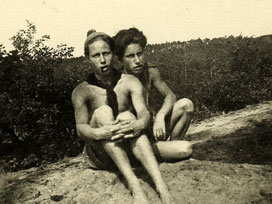 Sylvia: This is people’s favorite sentence in the film. “I spent my childhood getting to know my own cultural misunderstanding;” but perhaps I should talk about the questions of writing history which have come up, whether people “have a right to forget.” The film has caused some people to get defensive; on the one hand thinking it was curious that I should be so reproachful against my parents. That they had had a right to forget the horrors of the war, that they had only been children during the war and carried deep wounds and traumas from it, that they had been victims and not perpetrators, and thus could not be held responsible.
Sylvia: This is people’s favorite sentence in the film. “I spent my childhood getting to know my own cultural misunderstanding;” but perhaps I should talk about the questions of writing history which have come up, whether people “have a right to forget.” The film has caused some people to get defensive; on the one hand thinking it was curious that I should be so reproachful against my parents. That they had had a right to forget the horrors of the war, that they had only been children during the war and carried deep wounds and traumas from it, that they had been victims and not perpetrators, and thus could not be held responsible.
But my point, of course, is not that I reproach them for having been a part of the war, but rather for denying access to a past or annulling a history that brought them together, mystifying whatever they had gone through to get to that middle class status that they had so much desired. It is what I am doing, isn’t it, constructing my own personal history. And while I reflect about the state of human memory in the film, I am in fact doing the exact same thing by making that movie; I am constructing my own fiction, my own story, albeit in a subjective language. It is not part of my intention to get the absolute truth out, how could I? I do not see myself as any better than my parents who decided not to talk about the past, but I suppose I had the urge, the necessity to explore the story. But the question from the audience interests me nonetheless. I guess it is a matter of existentialist understanding of reality – does one have “the right” to forget trauma to continue living? Am I only privileged because I have physically never experienced a deep human catastrophe, a war?
Molly: I would hardly say that making a film makes you part of a privileged group which gains from the physical catastrophe to others. It seems to me that one of the most poignant threads in “Memories” is that it problematizes the cultural ambivalence and denial which the German people (and Europeans) have had towards the Second World War, which again makes audience response highly particular when the film is screened in Europe and particular in a different way when it is screened in the US. It would be my first thought that the film would fall into a categories here of being a woman- made personal history - and that this rich layer of information regarding broader, cultural ambivalence would be lost, especially because of the end of the film, where the dates of so many horrific wars, (many American-made) scroll up. By exposing the effects of a war on your parents and yourself you critically reframe the inheritance of war as a commonality between nations and people. I understand that you are now embarking on a new project about the radio commentator “Tokyo Rose”? Can you talk a bit about what has drawn you to the story?
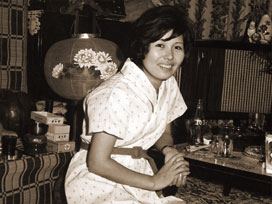 Sylvia: One of the reasons for my interest in the story is my bi-cultural background which I talk about in “Memories.” I believe that there is an unspoken, unseen, and unconscious memory I inherited from my parents which gives me the need to deal with the past. Many issues have been on my mind regarding the War Era in Japan, but this particular myth seemed to be an ideal agent to discuss a variety of themes I am interested in.
Sylvia: One of the reasons for my interest in the story is my bi-cultural background which I talk about in “Memories.” I believe that there is an unspoken, unseen, and unconscious memory I inherited from my parents which gives me the need to deal with the past. Many issues have been on my mind regarding the War Era in Japan, but this particular myth seemed to be an ideal agent to discuss a variety of themes I am interested in.
Molly: Many women all over worked in radio during World War Two. Can you say anything about Tokyo Rose myths and the broader field of communications, women, war?
Sylvia: The point of departure is this specific person whom the myth was attributed to: a Japanese-American woman who was forced to work as a radio broadcaster for the Japanese during the war. Her linguistic skills made her a subject the Japanese would have loved to use as a spy. So there is the voice that through radio distills all personal characteristics down to airwaves, to sounds and words and intonation, narrowing down the place where national identity is constructed to language on one hand and opening up spaces for fantasy and mystification on the other. I think it is important to unveil the roles that women have played in communications, and there are a lot of issues that can be touched there, but my main focal point is a story or a fiction of an individual woman who suffered a severe crisis because she was caught between two countries at war.
Molly: I see the making of films about female characters and women’s’ histories as a somewhat of a feminist effort. Do you see yourself as a feminist filmmaker?
Sylvia: Ideally I would want everyone to be a feminist. I used to think that it was completely unnecessary even to give that question a thought, because positive discrimination of women only emphasizes and institutionalizes male dominance in the subconscious of society. But with feminism considered being “dead” and with the increasingly derogatory notion that the word has been gaining in Germany, I would say, yes, for sure, I am a feminist. But, again, I don’t want to be categorized into any school of thought because I think that the idea and contents of so-called “Feminism” should be permanently re-evaluated according to contemporary socio-political realities.
Molly: Sylvia, I appreciate your taking time from your work to do this interview for Otherzine. I have enjoyed the process of writing between two cultures and, in particular, thinking about the difference in reception of films from one place to another. I hope we will benefit again soon from what you have to say and the ways you have to show us. Thank you and good luck with your future projects.
“Memories” by Sylvia Schedelbauer, 19 mins., BetaSP, color with sound.
Screenings:
2005 International Short Film Festival Oberhausen
2005 Tesla Salon, Berlin
2005 European Short Film Biennale Ludwigsburg
2005 Short Film Festival Flensburg
2005 Shadow Festival Amsterdam
2006 Center for Contemporary Art, Tel Aviv
2006 Wand 5 Stuttgarter Filmwinter
2006 Jerusalem Cinematheque
Citations
2005 Rencontre Internationale Paris/Berlin (Documentary Films)
2006 Director’s Citation Award Black Maria Film Festival
◊